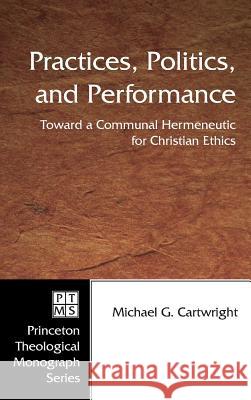Practices, Politics, and Performance » książka
Practices, Politics, and Performance
ISBN-13: 9781498248259 / Angielski / Twarda / 2006 / 276 str.
Practices, Politics, and Performance
ISBN-13: 9781498248259 / Angielski / Twarda / 2006 / 276 str.
(netto: 213,74 VAT: 5%)
Najniższa cena z 30 dni: 221,98
ok. 16-18 dni roboczych.
Darmowa dostawa!
Description: Drawing on the hermeneutical reflections of John Howard Yoder, Stanley Hauerwas, and Mikhail Bakhtin, Cartwright challenges the way twentieth-century American Protestants have engaged the ""problem"" of the use of scripture in Christian ethics, and issues a summons for a new debate oriented by a communal approach to hermeneutics. By analyzing particular ecclesial practices that stand within living traditions of Christianity, the ""politics"" of scriptural interpretation can be identified along with the criteria for what a ""good performance"" of scripture should be. This approach to the use of scripture in Christian ethics is displayed in historical discussions of two Christian practices through which scripture is read ecclesiologically: the Eastern Orthodox liturgical celebration of the Eucharist and the Anabaptist practice of ""binding and loosing"" or ""the rule of Christ."" When American Protestants consider ""performances"" of scripture such as these alongside one another within more ecumenical contexts, they begin to confront the ecclesiological problem with their attempts to ""use"" the Bible in Christian ethics: the relative absence of constitutive ecclesial practices in American Protestant congregations that can provide moral orientation for their interpretations of Christian scripture. About the Contributor(s): Michael G. Cartwright is Dean of Ecumenical and Interfaith Programs at the University of Indianapolis. He is the editor of The Jewish-Christian Schism Revisited, The Hauerwas Reader, and The Royal Priesthood.
Description:Drawing on the hermeneutical reflections of John Howard Yoder, Stanley Hauerwas, and Mikhail Bakhtin, Cartwright challenges the way twentieth-century American Protestants have engaged the ""problem"" of the use of scripture in Christian ethics, and issues a summons for a new debate oriented by a communal approach to hermeneutics. By analyzing particular ecclesial practices that stand within living traditions of Christianity, the ""politics"" of scriptural interpretation can be identified along with the criteria for what a ""good performance"" of scripture should be. This approach to the use of scripture in Christian ethics is displayed in historical discussions of two Christian practices through which scripture is read ecclesiologically: the Eastern Orthodox liturgical celebration of the Eucharist and the Anabaptist practice of ""binding and loosing"" or ""the rule of Christ."" When American Protestants consider ""performances"" of scripture such as these alongside one another within more ecumenical contexts, they begin to confront the ecclesiological problem with their attempts to ""use"" the Bible in Christian ethics: the relative absence of constitutive ecclesial practices in American Protestant congregations that can provide moral orientation for their interpretations of Christian scripture.About the Contributor(s):Michael G. Cartwright is Dean of Ecumenical and Interfaith Programs at the University of Indianapolis. He is the editor of The Jewish-Christian Schism Revisited, The Hauerwas Reader, and The Royal Priesthood.











